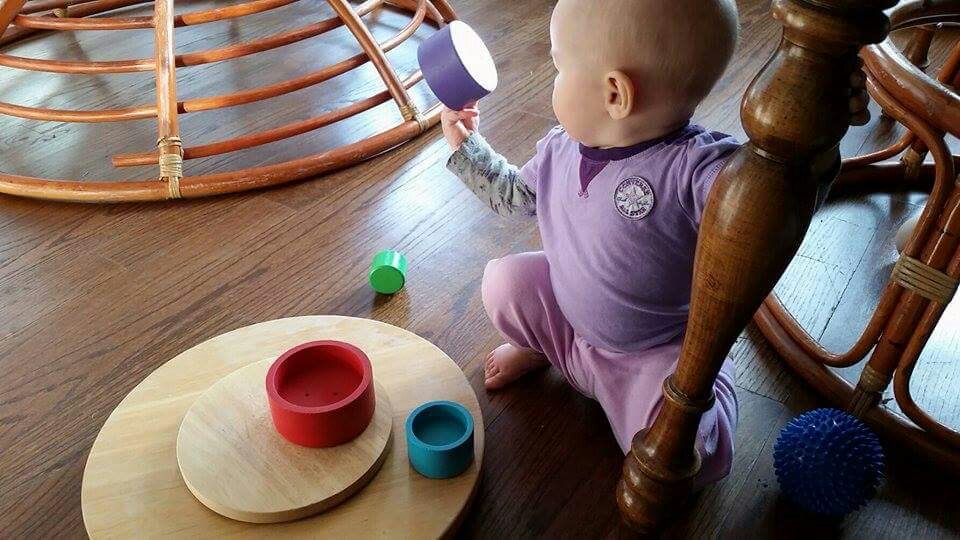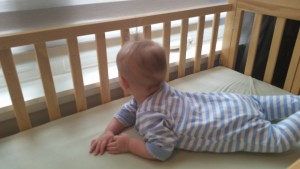Magda begins the article:
“I feel strongly ambivalent about calling attention to a book that I consider harmful. In our society, a negative response attracts more attention and, therefore, may sell a product better than a positive one. Yet, since several mothers have asked for my opinion on a book with the catchy title “Toilet Training in Less Than a Day” (Simon Schuster, 1974, N.Y.) I will share my concerns with you.
On the back book cover a photograph shows the smiling authors, Nathan H. Arrin and Richard M. Fox, squatting, with a child and a musical potty chair between them. The front cover of the book says, “The breakthrough book that describes a professional-tested new method of successful toilet training in one pleasant and exciting learning period.” How can even a sensitive, knowledgeable mother resist all that?
The book certainly lays the ground work for credibility. After describing their previous research work with profoundly delayed persons who, with their method could be trained in three days, the authors, both with PhD’s, devised their method for “normal” children. ‘Within three or four hours,’ they write, ‘the young child has learned to toilet train himself…’ (page 10 of book). In case you are not desperate enough about toilet training, here are some of the titles of 23 mother’s letters: Help – 36 months,” “At our wits’ end – 47 months,” “He positively will not – 32 months, “Tried everything – 42 months, “I am desperate – 24 months and 36 months.” (pgs.13, 14, 18).
The authors of the book then proceed to tell how expensive diapers are, about $200 a year for disposable and diaper service (much more in 2012), or how much time and energy it costs to do the laundry yourself. But this is minor compared to what you go through with each diapering, which takes “about nine hours per week.” *(pg.21).
“In criticizing the “old method”, Magda goes on to say, the authors further elaborate on how much of the mother’s time that training requires. ‘She must dress and undress the child, sit him on the chair, remain with him for an extended period, dress him again and empty the potty in which he urinated.’ (pg.24). It sounds like the authors have difficulties believing that mothers may enjoy being with their children, or lo and behold, even enjoy caring for them.
Obviously one advantage of the “new training method” is speed. Another one, “the pleasantness of the …experience (pg 31) is more questionable. I will sketch some aspects of the procedure so each of you can decide how pleasant or unpleasant the experience sounds to you for your baby and yourself. Throughout the procedure “your intent is to give your child undivided attention and you should not allow any even to interrupt the interaction.” (pg.47) (No phones, TV, radio, guests or even family members).
Place: in the Kitchen. Aids and Supplies: A potty chair, a doll (which can drink and urinate) for demonstration, many snack items for reward, a variety of drinks for reward, and to fill the child’s bladder. “If you child is reluctant to drink…stimulating his thirst by giving salty items… by placing the cup against his lips and lifting it…” (pg 62). When the child does what the mother wants, rewards him with praise, snacks, drinks, hugging, kissing, clapping, “be enthusiastic, exuberant, excited, and expressive and let this delight be very visible. (pg.70). In addition you can call on a “supportive crowd of enthusiasts, such as aunt, uncle, and friend, Captain Kangaroo or Grandma. Grandma will be so happy.”
But what if the child has wet pants?… The Book continues, “Reprimand him immediately by loudly saying, “No!” “Wetting is bad.” “Mommy does not like wet pants.” (pg 84)… and then make him practice. “Practice going to the potty chair, practice quickly. Practice pulling your pants down. Practice quickly. Practice getting up quickly, you wet your pants. Practice pulling your pants up, practice quickly.” (pg. 85).
Magda says, “I cannot help having a frantic nightmare at this point. I see miniature Charlie Chaplin moving quickly to the potty chair, urinating (potty chair signals), eating salted crackers, drinking more fluid, standing up, pulling pants up, down quickly, quickly faster, faster, stop. It seems like the caricature of a future shock world for children.”
The reality is that once a child decides to use the toilet, he knows how to do it. It is unnecessary to teach, practice, and exercise the little techniques. Children do learn to dress and undress themselves if parents encourage cooperation every time they care for them. If each diapering has been a pleasurable experience, a true dialogue between parent and child, if the mother has given her full attention during all these times, she will not need the special circus performance of “The Day” (of training).
But suggestions to parents to do something unnecessary would not drive me to call a book harmful. In order to convey my concerns I will try to describe how much more is involved in toilet training than just getting urine and feces in the toilet.
Toilet training happens as a result of a healthy, normal child, living in an average accepting, caring family. As a part of his natural development the child wants to b e like, and act like, his parents. The child has to be ready physically (capacity of the bladder to hold more fluid, better muscle control), cognitively (be fully aware of what he is expected to do), and emotionally (be ready and willing to give up a comfortable situation, such as just letting urine and feces out whenever it does so naturally). For the child it means that he has to delay and control a natural urge, to give away something that he may believe is still part of his body, and therefore valuable, and to conform to an adult-designed and time routine. It is an area and time of inner conflict.
Endless volumes have been written on the consequences of how a child achieves this important milestone on his way to autonomy. In Erick Erikson’s famous epigenetic chart*, the first three critical steps, conflicts or crises a young child must go through are: trust vs. mistrust during infancy, autonomy vs. shame and doubt and around toddlerhood and initiative vs. guilt during the preschool years.
Let us now come back to the book we started with. On page ten the authors state: “No single theoretical orientation is followed exclusively. The procedure borrows heavily from the many different approaches to children. We have utilized the psychoanalytic emphasis on the possible effect harsh toilet training on later personality by making the experience a pleasant one.” This latter statement shows that the authors have a full misconception of what the psychoanalytic theory is all about. There are few concepts as thoroughly described in psychoanalytic literature as toilet training, the vicissitudes involved, the characteristics of the anal personality, etc. To go into more detail on this huge subject is beyond the scope of this writing. I will mention some of the struggles of early childhood which have an effect throughout our whole life:
Dependence and independence or autonomy
Holding on and letting go
Taking and giving
Progression (wanting to grow up) and regression (wanting to stay a baby)
Though these are lifelong struggles, they seem to be crucial during the anal stage of development. Erikson writes, “this (anal) stage, therefore, becomes decisive for the ration of love and hate, cooperation and willfulness, freedom of self-expression and it suppression. From a sense of self-control without loss of self-esteem comes a lasting sense of good will and pride; from a sense of loss of self-control and of foreign over-control comes a lasting propensity for doubt and shame. (pg 254).
Magda goes on to say, “I feel sorry for the parent who tricks and treats his child rather than trusts him. I feel sorry for the child is manipulated and deprived of making this important step towards autonomy by his own volition.
I believe the “gentle” operant conditioning the book advocates is as harmful and psychologically harsh as any old punitive, bribing, coercing method ever used. It shows no respect or love for the child, but a phony, exuberant and manipulative joy for his performance. This book is the product of our impatient society looking for instant results, forgetting the importance of every experience in the long process of learning.” *Erik H. Erikson, Childhood and Society, W. W. Norton, NY. 1950
Magda Gerber and Emmi Pikler spent years researching and observing children. Their results and findings are invaluable. The book Magda is describing was written in 1974. Her observations can be used for any of the numerous article and books on the market today. We do unspeakable things to our children. Potty training before a child is ready is one of them. Thank you to Magda Gerber for her reliable, dignified, respectful and thoughtful methodology. Article taken from “A Manual for Parents and Professionals” Published by Resources for Infant Educarers, Copyright, 1979. (Pages 40-42)
Posted by: Roseann Murphy, April, 26 2012 on Little River School Online
[https://littleriverschool.wordpress.com/2012/04/26/toilet-training-by-magda-gerber/]




